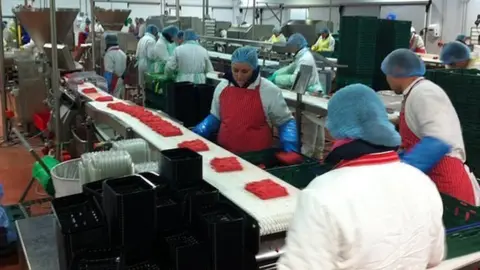Coronavirus: Concerns over Covid-19 cases in NI meat plants
 BBC
BBCConcerns have been raised about the incidence of coronavirus in several meat plants in Northern Ireland.
At the weekend, trade union Unite said it was aware of a number of cases amongst workers at Linden Foods in Dungannon.
In Monday's Tyrone Herald, there is a story about concerns by some staff at a different company - Omagh Meats.
Omagh Meats' parent company Foyle Food Group Limited (FFG) has confirmed some of its employees tested positive.
However, it did not provide specific numbers.
Unite has called for testing for all food production workers in the sector and temporary closures for deep cleans where necessary.
Organiser Davy Kettyles said the situation was "hugely concerning".
Unite said it was aware of seven cases of Covid-19 in Linden.
It is understood they have been confirmed over the space of several weeks.
Testing
In a statement, Linden said since agri-food workers had been approved for government testing it had insisted any staff showing symptoms avail of the measure.
"To date, we have received both positive and negative Covid-19 results and continue to reinforce our rigorous health and safety Covid-19 protocols," a spokesperson said.
"We report all Covid-19 related absences to the designated government agency."
About 1,100 staff work in two Linden facilities in Dungannon. The union is not recognised by management, which operates a system of worker councils.
 PAcemaker
PAcemakerThe company has put in place rules to facilitate social distancing including staggered start times and has spent a six figure sum on measures including protective screens.
It has engaged with the Health and Safety Executive for Northern Ireland (HSENI), though as yet there has been no inspection, something the union has called for.
FFG said it was also complying with government and health and safety guidance to protect employees.
It said deep cleans were being carried out on a daily basis and social distancing was in place.
"We can confirm that a number of employees at our Omagh site have confirmed positive for Covid-19," an FFG spokesperson said.
"We are providing full support to these employees, who are no longer attending for work.
"Other employees who have been in contact with any affected employees are also being tested."
FFG has operated in Northern Ireland for more than 40 years and currently employs more than 1,400 people across the UK and Ireland.
The food industry issued its own guidance on measures for factories and it was followed up with similar recommendations produced by an executive-established committee involving employers, trade unions, the public health agency and the HSENI.
They included the need for two-metre distancing, the provision of personal protective equipment where necessary and the installation of partitions where social distancing could not be achieved.

- EASY STEPS: How to keep safe
- A SIMPLE GUIDE: What are the symptoms?
- CONTAINMENT: What it means to self-isolate
- HEALTH MYTHS: The fake advice you should ignore
- MAPS AND CHARTS: Visual guide to the outbreak
- VIDEO: The 20-second hand wash

An HSENI spokesperson said there had been inspections of food processing facilities over the past week and that unannounced inspections would continue over the coming weeks and months.
They added that HSENI took complaints raised by unions and employees seriously and was working with DAERA and industry representative bodies to monitor issues "and provide information and clarification where possible".
Clusters
The issue of coronavirus clusters in meat plants has been seen in the Republic of Ireland, where 10 have had clusters of infection involving almost 600 staff.
Mr Kettyles called on the Northern Ireland Executive to do more: "In the Republic, we have seen outbreak control teams sent to deal with clusters but the Northern Ireland Executive has done nothing."
Monitoring has been going on to assess the impact of the virus on food production facilities - which continue to operate at full capacity according to industry body the Northern Ireland Food and Drink Association.
Its recent figures shows that absenteeism from work changed from 14% in early April to 8% towards the end of that month.
